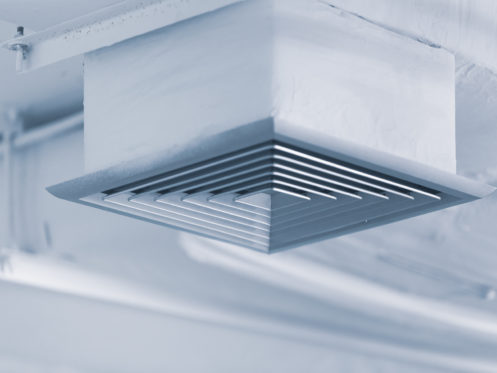The AC, furnace, and heat pump come in handy when you want to adjust the temperature of your home. However, the heating and cooling of your home do not come cheap and typically contribute to half of your energy bills. As the outside temperatures move towards the extremes, the demand for your heating and cooling system increases. As a result, the energy bills soar even higher.
The rise in energy costs forces many people to look for all possible ways to reduce the burden. Some homeowners think closing the vents upstairs can save money. Unfortunately, it is a myth and can actually do more harm than good.
It Lowers Efficiency
Your heating and cooling system relies on air balance to perform its duties as expected. Manufacturers tailor the HVAC system to match your home’s size and HVAC requirements with the assumption that all vents are open. Unfortunately, the system has no way of knowing about closed vents to compensate for the difference.
When you close off the vents upstairs, you increase the air pressure being exerted. The sudden change interrupts the blower’s usual functioning, which is the lifeline of the HVAC system. Generally, we have two kinds of blowers, electronically commutated motor (ECM) and permanent split capacitor (PSC).
The ECM and PSC have a maximum pressure rating beyond which they become inefficient. High-efficiency systems use ECM to boost the motor’s speed to maintain good airflow. However, this requires more energy and is never guaranteed to restore proper airflow. On the other hand, higher pressure lowers the speed of the PSC motor reducing the airflow.
Ductwork Leakages or Bursting
The ducts are subject to wear and tear due to prolonged use and corrosion from moisture. They may develop minuscule holes that cause air to seep in and out of their surroundings. Poor connections contribute to air loss and significant energy losses as well.
Closing the vents restricts air circulation in the system and creates pressure buildup in the ducts. Soon, the air inside the ducts finds loopholes in the cracks, causing leakage. As the air pushes against these tiny holes, the pressure enlarges the holes, worsening the underlying leakages. However, if the duct has no holes but does have a loose connection, the high pressure can easily cause a burst.
Duct leakages can account for 30% of your energy usage. Fortunately, our technicians at Dring Air Conditioning & Heating use many methods to locate and seal all holes. We also advise residents of Carrollton to insulate their ducts to prevent heat loss and damage to the ductwork.
Promotion of Mold Growth
The cause of mold growth is moisture content and stale air. Mold infestation does well on the ceiling, walls, furniture, paper, mats, tiles, and fabrics. The tiny spores are not just bad for your home’s aesthetics but also for your health. Molds cause persistent sneezing, wheezing, and itchiness of the eyes and the skin. Unfortunately, these tiny microorganisms can lead to severe reactions in people with respiratory conditions such as asthma and pneumonia.
When you lock the vents upstairs, you prevent air from circulating in those rooms. Minimal airflow makes the temperatures drop significantly, promoting condensation, which is the perfect setting to promote mold growth. You will notice a musty odor or observe black or green mold if the situation has gone undetected for some time.
Mold control is a simple matter when you follow proper guidelines from your HVAC technicians. However, removing mold from the heating system is no easy task. When mold reaches the ducts, it finds plenty of dust to feed on and multiply rapidly. An HVAC expert from Dring Air Conditioning & Heating can remove the mold safely and thoroughly.
Carbon Monoxide Poisoning
Whereas closing vents is a nuisance to your home’s comfort and budget, carbon monoxide has dire consequences. We strongly encourage every homeowner in Carrollton to use carbon monoxide detectors and check the batteries as often as possible. The odorless, colorless, and tasteless gas is lethal, causing death within hours of exposure. Typically, the gas will replace oxygen once inhaled, causing symptoms such as the following.
- Headaches
- Fatigue
- Drowsiness
- Nausea or vomiting
- Breathing difficulties
- Confusion
- Blurred vision
- Unconsciousness
When you close the registers of the upstairs rooms, there is insufficient air for combustion. Little airflow causes the heat exchanger to crack, producing carbon monoxide. The gas escapes through the tiny holes into your home, leading to the above symptoms.
Air Conditioner Coil Damage
The evaporator coil contains a refrigerant compound, which changes from low-pressure gas to high-pressure liquid after heat absorption. Typically, the refrigerant cools the coils to make the heat exchange possible. Due to low temperature, the evaporator promotes condensation, making water droplets form on the coil.
Closing the vents restricts airflow to the coils, making them even cooler. The temperature drops drastically, and the water droplets on the coil freeze. Consequently, it becomes hard for the HVAC unit to exchange heat, resulting in no change to the home’s temperature. Allowing the HVAC unit to continue operating with a frozen coil can cause more damage to your unit. Not to mention that after melting a frozen coil will also lead to water puddles in unwanted areas around the AC, which could also encourage mold growth.
Inconsistent Home Temperature
HVAC systems contain thin metal plates called dampers or volume balancing dampers. The plates help regulate the amount of airflow that goes to each room and the amount of heating or cooling needed to achieve the desired temperatures.
Closing some of the vents causes the blower to supply different amounts of air to various rooms. Generally, rooms closer to the blower tend to have more airflow than those further away. Consequently, the rooms become cooler or hotter based on your thermostat settings.
Faster Damage to Your System
Shutting the vents increases the air pressure, ultimately adding more strain to your system. The HVAC works harder than usual to regain balance. Whenever the HVAC unit works overtime and is under stress, the likelihood of wear and tear increases significantly. This will erode the system faster over time. A shorter lifespan of the HVAC means early replacements or costly repairs.
Conclusion
Your HVAC systems work perfectly with all vents open. Closing any register interferes with the airflow circulation making your HVAC work harder and use more energy. The additional power translates into more electricity bills.
You can trust Dring Air Conditioning & Heating when it comes to your HVAC unit. We specialize in home cooling solutions such as air conditioning installations and repairs. We also offer heating installations and repairs, as well as thermostats, fan coils, ductwork, and indoor air quality services. You can find specials deals and an optional annual maintenance plan on our website! We proudly serve Carrollton and all surrounding areas. Give us a call today!







